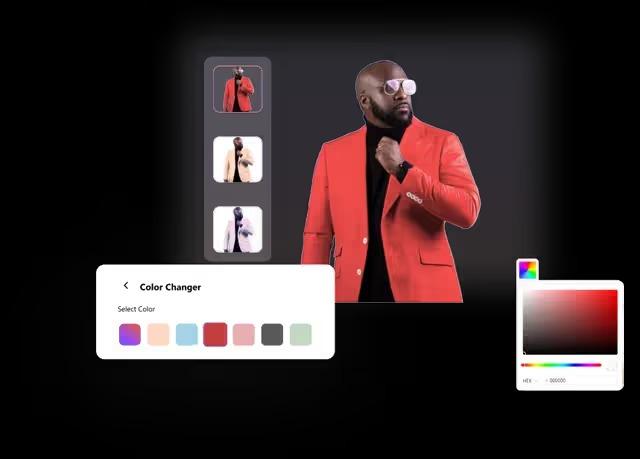AI Color Changer vs Traditional Editing Software: Which Should You Use?

As digital content creation continues to grow, creatives and marketers are seeking faster, easier, and more efficient solutions. This shift has brought AI color changers to the forefront intelligent tools that instantly change image colors without complex manual steps. But are they better than traditional software like Photoshop or Lightroom? In this article, we’ll compare both editing methods and help you choose the right solution for your needs.
What is an AI Color Changer?
An AI color changer is a smart editing tool that uses machine learning and neural networks to detect and adjust colors within an image. These tools automate the process of selecting and recoloring objects like clothing, backgrounds, or products saving both time and effort. Most require just a few clicks to deliver high-quality results, making them ideal for non-designers and professionals alike.
How Does Traditional Color Editing Work?
Traditional tools such as Adobe Photoshop or Lightroom offer powerful manual control. To recolor an image manually, users typically:
-
Select objects or regions using the lasso, pen tool, or quick selection tools.
-
Apply adjustments such as hue/saturation or color fill layers.
-
Blend or mask areas to preserve natural shadows and lighting.
-
Export in high-resolution using custom formats.
While this method provides unmatched precision, it requires technical skill and more time investment per image.
Comparing Key Features
1. Ease of Use
-
AI Color Changers: Extremely beginner-friendly with intuitive interfaces.
-
Traditional Software: Requires knowledge of tools, layers, and techniques.
2. Speed & Workflow Efficiency
-
AI Tools: Enable instant previews and one-click recoloring.
-
Photoshop: Time-intensive, especially for high-volume edits.
3. Accuracy & Control
-
AI: Accurate for most basic edits but limited in handling complex image structures.
-
Photoshop: Offers full control over every pixel with manual adjustments.
4. Creative Freedom
-
AI Tools: Limited to color editing and auto-enhancements.
-
Photoshop: Allows advanced design elements, effects, blending, and multi-layer compositions.
5. Cost & Accessibility
-
AI Tools: Often free or low-cost with web-based access.
-
Photoshop: Subscription-based and requires installation.
Best Use Cases for AI Color Changers
-
Social media creators producing content at scale.
-
E-commerce businesses editing product color variants.
-
Beginners or marketers with no design background.
-
Visual A/B testing for campaigns.
-
Quick background or clothing color changes.
Best Use Cases for Traditional Editing Software
-
Graphic designers needing precise, layered control.
-
Advertising professionals working on high-resolution commercial visuals.
-
Projects involving advanced color grading or complex composites.
-
Multichannel design campaigns requiring consistent templates.
-
Artistic projects demanding custom effects and branding elements.
Conclusion: Choosing the Right Tool for Your Workflow
The choice between AI color changers and traditional editing software depends on your goals, skills, and the complexity of your work. If you're focused on speed, simplicity, and low-cost edits—AI tools are perfect. They’re great for quick campaigns, product mockups, and social media visuals.
However, if your work demands high precision, advanced creativity, and full design control, Photoshop or Lightroom remains the industry standard.
For many users, the best approach is a hybrid one—use AI tools for fast recoloring, then bring the results into Photoshop for detailed refinements. This gives you the best of both worlds: automation and creative freedom.
FAQs – AI Color Changer vs Photoshop
Is AI editing as good as Photoshop?
AI editing is efficient for simple color changes, like recoloring clothing or backgrounds. Photoshop is better for detailed, multi-layered edits.
Can I use both AI and Photoshop together?
Yes, many professionals start with AI tools for fast recoloring, then fine-tune in Photoshop.
Which is more beginner-friendly?
AI color changers are much easier to use and require no design experience.
Is Photoshop better for professional work?
Yes, Photoshop offers comprehensive editing features suited for professional and commercial projects.
Do AI tools offer high-resolution outputs?
Most AI tools allow high-quality exports, though resolution options may vary by platform.
Are AI tools free?
Many AI tools are free or offer basic features at no cost, with premium plans for advanced features.
Can AI tools handle batch processing?
Yes, some AI platforms offer batch editing, especially useful for e-commerce and content teams.
Which is faster?
AI tools are significantly faster for simple color edits, offering instant results.
Do I need design skills to use AI tools?
No. AI color changers are designed for ease of use by beginners and non-designers.
Can AI tools replace Photoshop?
Not fully. AI tools are great for efficiency but lack the depth of customization and functionality available in Photoshop.
- Art
- Causes
- Crafts
- Dance
- Drinks
- Film
- Fitness
- Food
- Jocuri
- Gardening
- Health
- Home
- Literature
- Music
- Networking
- Alte
- Party
- Religion
- Shopping
- Sports
- Theater
- Wellness




